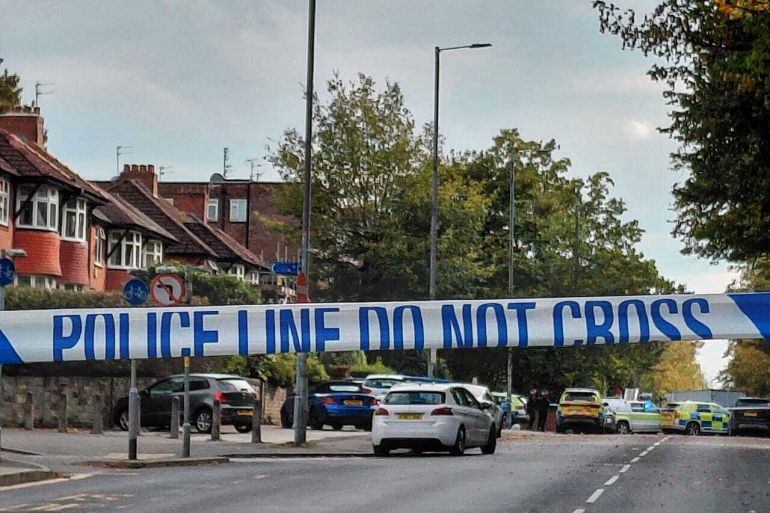Shock and disbelief as Manchester community reels from synagogue attack
Residents in UK’s Crumpsall say they are shocked after a car and knife attack near synagogue kills two people.

Published On 2 Oct 20252 Oct 2025
Save
Manchester, England – As people gathered near a synagogue in Manchester, hours after an attack there killed two people, many struggled to make sense of the assault. Attacks don’t happen in places like this, locals say, not least on Yom Kippur.
About 9.30am (08:30 GMT) on Thursday, a man drove his car into people near the Heaton Park Hebrew Congregation Synagogue in Crumpsall in the north of Manchester before emerging to attack others with a knife.
Recommended Stories
list of 3 itemsend of list
The synagogue’s security staff and members of the public prevented him from entering the building before police arrived and fatally shot the assailant, who appeared to be wearing an “explosive device”, police said. Four injured people were admitted to hospital in serious condition.
Two people have been arrested since the attack, said the Metropolitan Police’s head of counterterrorism policing, Assistant Commissioner Laurence Taylor. The identity and potential motives of the attacker have not been disclosed.
Standing with some of his family on the corner of a nearby road with a police helicopter hovering overhead, 23-year-old Zaki said he still can’t believe what happened.
“I heard the shots this morning,” he told Al Jazeera. “It didn’t seem believable. I thought it was fireworks.”
Zaki echoed the comments of many who gathered around the synagogue. These things don’t happen here, onlookers said. Crumpsall has long been a multicultural area. “Everyone in our community gets on well,” Zaki said. “Our neighbours are Jewish.”
Another resident, 41-year-old Sam Martin, also described struggling to understand the attack.
Advertisement
“There’s everyone here,” he told Al Jazeera, “Muslims, Jews, everyone. I’ve known nothing but love and kindness from our Jewish community. I’m just shocked this could happen.”
According to many people in the neighbourhood, even Israel’s war on Gaza hasn’t caused any great division within the community. However, many expressed concerns that far-right groups – their confidence fuelled after an August campaign to hang English flags across the country and a mass rally in London a month later – would seek to take advantage of the attack to further unrest.
Far-right activist Stephen Yaxley-Lennon, who uses the pseudonym Tommy Robinson, quickly seized upon the attack, assigning blame to groups from the Board of Deputies of British Jews to the United Kingdom’s ruling Labour Party for the assault despite the identity and potential motives of the attacker remaining unclear.
Israeli Foreign Minister Gideon Saar criticised British authorities, accusing them of failing to curb anti-Semitism.
“Blatant and rampant antisemitic and anti-Israeli incitement, as well as calls of support for terror, have recently become a widespread phenomenon in the streets of London, in cities across Britain, and on its campuses,” he wrote on X.
British Prime Minister Keir Starmer said the attacker was a “vile” person who was motivated to attack Jews “because they are Jews.”
One of the young men gathered near the police cordon, 23-year-old Akiva, who asked neither to be recorded or have notes taken during his interview out of respect for the holiday, was sure the English far right would seize upon the attack. He said the attack has shaken Jewish residents and would likely sow divisions in the otherwise quiet and well integrated community.
Akiva had come to the synagogue to check on his brother, who normally took a route past the synagogue on his way to worship. He said his mother collapsed when she first heard of the attack so close to their home in Manchester.
Other members of the district’s Jewish community gathered nearby spoke of feeling targeted for their identity, of having been attacked on their holiest day of the year.

